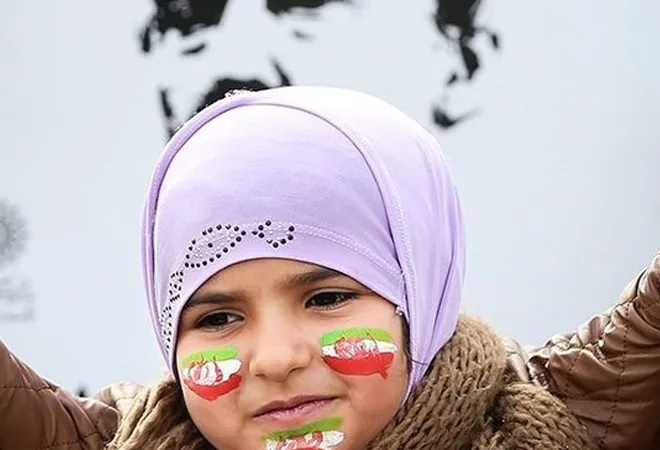
The presidential election in Iran on 19 May that gave a huge mandate to the incumbent President Hassan Rouhani has come as a big relief to majority of Iranians and to several leaders in the world who feared that a relatively unknown hardliner may have dangerously precipitated an already volatile situation in the region. But there still remains another variant that could upend the situation seriously and that is US President Donald Trump.
It was a strange coincidence that on the very day Iran was celebrating the triumph of popular vote by re-electing a moderate President, President Trump was in Riyadh bowing down and curtseying to the Saudi King to receive a gold medallion, the highest civilian of honour from the Kingdom, an act for which he had mocked President Obama as being slavish.
Islamic Summit
On 21 May, President Trump, at the US–Arab–Islam summit in Riyadh, addressed a gathering of over 50 Kings, Emirs, Presidents and Prime Ministers, mostly unelected rulers of the Arab and Islamic World. He focused on countering regional rival.
"Starving terrorists of their territory, their funding, and the false allure of their craven ideology, will be the basis for defeating them," President Trump said. "But no discussion of stamping out this threat would be complete without mentioning the government that gives terrorists all three — safe harbour, financial backing, and the social standing needed for recruitment. It is a regime that is responsible for so much instability in the region. I am speaking of course of Iran," said President Trump, but he could have as well named Pakistan, Saudi Arabia, Qatar, the UAE or Turkey for that matter and would have been equally right. While he was in the region, Trump should have also enquired as to how come, neither the Al Qaeda nor the ISIS have carried out a single terror attack in the Kingdoms of Qatar, Kuwait, Bahrain, Jordan, or the Emirates of Abu Dhabi and Dubai. Is it perhaps due to the protection money the Kings are paying them or that even the worst terrorists have some moral code — not to bite the hand that feeds them?
Fact check
A fact-check of President Trump's statement reveals some strange anomalies. It is true that Iran supports the Hezbollah in Lebanon but how many US nationals have been killed by them? Around 289 deaths of American nationals are directly or indirectly blamed on the Hezbollah, according to one unverified blog of an Israeli supporter. And how many American civilians and military personnel have been killed by the Al Qaeda, Taliban and other terror groups supported by the Sunni Arab world and Pakistan? 4,486 US soldiers died in Iraq while 2,345 US soldiers died in Afghanistan and 1 million soldiers were wounded in both the battle theatres at a potential cost of $6 trillion to the US economy. This is in addition to the 2996 unarmed civilians killed, 6,000 injured at a cost of $10 billion in costs to the property and infrastructure damage of $3 trillion in the attacks on US soil by the Al Qaeda on 9/11.
Nobody grudges the US its right to choose its friends and enemies, but at least the choice should be made in line with its own security interests. How can the US repeatedly choose the very countries as allies that have attacked its civilians, military personnel and the core national symbols of power — from its embassies in Kenya, Tanzania, to the WTC in New York to Pentagon in Washington? Has President Trump forgotten that out of 19 Al Qaeda terrorists who attacked the US on its soil on 9/11, 15 of them came from Saudi Arabia?
Is President Trump not aware that almost all the attacks on US personnel in Afghanistan came from either Pak-sponsored or Pak-based terrorists? And neither the Saudi Kingdom nor Pakistan have taken any steps to stop its nationals considering America as the greatest enemy of Islam. The Wahabi preachers never stop inciting hatred against the US and UK. And so do the Generals and Mullahs in Pakistan who shaped the narrative that Osama bin Laden was a hero who needed to be protected from the American Army and the Taliban who kill Americans are the Good Taliban.
Why Iran?
Then how do the US Presidents, particularly the Republicans, repeatedly choose the Sunni Arab world as their favourite allies and the Shia Iran as the main enemy? The history of the hostility goes back to the early 1950s when both the UK and the US tried to grab the oil wealth of Iran. It was in August 1953 that the treachery started when the first democratically elected government of the nationalist Prime Minister Mohammed Mossadegh in Iran was ousted by the machinations of MI6 and the CIA. His fault was that he had dared to nationalise the Anglo-Iranian Oil Company owned by the British government.
And then on to more recent times the Revolutionary government of Ayotallah Khomeni, soon after coming to power in late 1979, aided and abetted the seizure of the US embassy in Tehran and held 52 US nationals including diplomats and staff as hostages for 444 days from November 1979 to January 1981. The immediate provocation for the hostage crisis was that the then US President Jimmy Carter granted sanctuary to the deposed Iranian despot the Shah of Iran. The real reason had deeper roots. It was the unstinted support extended to the regime of Shah of Iran from 1941 to 1979, who had ordered the killings of thousands of young Iranians for being religious preachers or communists, while handing over the precious national resource; Iranian oil to the British and American companies. The dreaded secret service of Shah, the SAVAK founded with the help of CIA and of Mossad had inflicted abominable torture and had killed thousands of innocent Iranians.
It's nobody's argument that Iran is now a perfect democracy but among all the Islamic countries in the Middle East from the Persian Gulf to Suez Canal and beyond right up to Morocco on the Atlantic Coast, it is probably the one country that gives the right to its people to choose its President, however imperfect is the selection of the two finalists. Speaking of imperfect democracies, people in that region question as to how a person getting 3 million votes less than the opponent could be declared a winner in the US.
And thanks to the 'Iranian people' a hardliner like Ebrahim Raisi, who reportedly had the blessings of the Supreme Leader and that of the Iranian Revolutionary Guards Corps, has been soundly defeated. The hardliners wanted no more rapprochement with the West but wanted to Iran back on the path of confrontation with the world and resume its nuclear weapons programme.
It is strange that these anachronistic Kingdoms and dictatorships still survive in the 21
st century wherein new forms of social media have revolutionised the frontiers of social and political awareness, but it is even stranger that the US and other Western democracies that so regularly champion human rights still indulge these Kings and dictators and continue to arm them to commit more and more brutal violations of human rights on their own citizens or in their neighbouring countries.
On the other hand Iran which has been waging a war against the ISIS, the declared enemy of President Trump, is dubbed a terrorist country. President Rouhani and the Iranian paramilitary force the Al Quds have been fighting the ISIS well before President Trump came to power. And now the re-election of Rouhani will ensure that Iran in partnership with Russia will continue to fight the ISIS because it affects its own survival and that of all the Shias and Alwaites in Iraq and Syria. President Trump, however, is extremely capable of drastically changing all that by imposing more sanctions on Iran not because it violates the nuclear agreement with the P5+1 but because Saudi Arabia and Israel consider the agreement itself foul.
US weapon sales
The Middle East is drifting towards another crisis with President Trump arming the Saudi Kingdom with a 110 billion dollar arms deal and launching a so-called Sunni NATO force. The Saudi Kingdom is waging a vicious war of aggression for over 2 years on the hapless people of Yemen without caring for the admonition of the UN, because the US is an accomplice in the crime. Saudi Kingdom blames the war on the Iranian supported Houthis in Yemen but the unforeseen consequence, though not entirely unintended, has been the revival and empowerment of Al Qaeda in Maghreb.
The one notable consequence of US intervention in the region from Afghanistan to Iraq, Libya to Syria has been that, despite the investment of thousands of billion dollars and the loss of over 6,800 American soldiers in Afghanistan and Iraq, America has neither won any of the wars nor has terrorism been decisively defeated in the region. Thanks mainly to its allies and partners in the region.
The views expressed above belong to the author(s). ORF research and analyses now available on Telegram! Click here to access our curated content — blogs, longforms and interviews.



 The presidential election in Iran on 19 May that gave a huge mandate to the incumbent President Hassan Rouhani has come as a big relief to majority of Iranians and to several leaders in the world who feared that a relatively unknown hardliner may have dangerously precipitated an already volatile situation in the region. But there still remains another variant that could upend the situation seriously and that is US President Donald Trump.
It was a strange coincidence that on the very day Iran was celebrating the triumph of popular vote by re-electing a moderate President, President Trump was in Riyadh bowing down and curtseying to the Saudi King to receive a gold medallion, the highest civilian of honour from the Kingdom, an act for which he had mocked President Obama as being slavish.
The presidential election in Iran on 19 May that gave a huge mandate to the incumbent President Hassan Rouhani has come as a big relief to majority of Iranians and to several leaders in the world who feared that a relatively unknown hardliner may have dangerously precipitated an already volatile situation in the region. But there still remains another variant that could upend the situation seriously and that is US President Donald Trump.
It was a strange coincidence that on the very day Iran was celebrating the triumph of popular vote by re-electing a moderate President, President Trump was in Riyadh bowing down and curtseying to the Saudi King to receive a gold medallion, the highest civilian of honour from the Kingdom, an act for which he had mocked President Obama as being slavish.
 PREV
PREV


